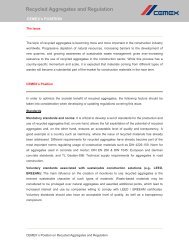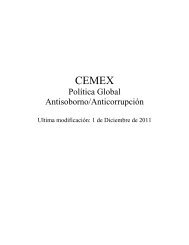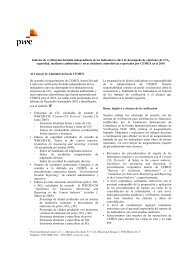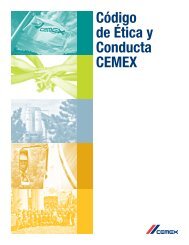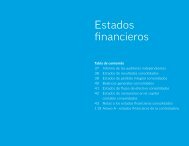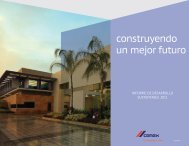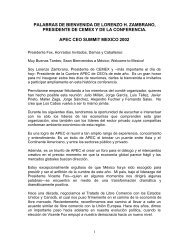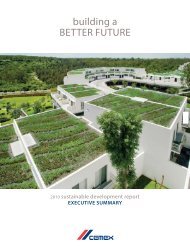building a STRONGER foundation - Cemex
building a STRONGER foundation - Cemex
building a STRONGER foundation - Cemex
Create successful ePaper yourself
Turn your PDF publications into a flip-book with our unique Google optimized e-Paper software.
CEMEX, S.A.B. DE C.V. AND SUBSIDIARIES<br />
Notes to the Consolidated Financial Statements – (Continued)<br />
As of December 31, 2010, 2009 and 2008<br />
(Millions of Mexican pesos)<br />
In September 2009, the CNC, applying exclusively national antitrust law, separately conducted its own inspection in the context of possible<br />
anticompetitive practices in the production and distribution of mortar, ready-mix and aggregates within the Chartered Community of<br />
Navarre (“Navarre”). In December 2009, the CNC started a procedure against CEMEX España for alleged practices prohibited under the<br />
Spanish competition law. In November 2010, the CNC provided CEMEX España with a Statement of Facts that included some allegations<br />
that could be construed as a possible infringement by CEMEX España of Spanish competition law in Navarre. The Statement of Facts was<br />
addressed to CEMEX España, but also indicated that its parent company, New Sunward Holding B.V., could be jointly and severally liable<br />
for the investigated behavior. On December 10, 2010, the CNC Investigative Department notified CEMEX of its proposed decision, which<br />
declared an existence of infringement, and will submit the proposed decision to the CNC Council. The notification of the proposed decision<br />
marked the end of the investigation phase. On December 29, 2010, CEMEX submitted its opposition to the proposed decision denying all<br />
charges formulated by the CNC. The CNC must issue a final decision within 18 months from the formal start of the procedure, which<br />
began on December 15, 2009. The maximum fine that the CNC could impose would be 10% of the total revenues of CEMEX España’s<br />
ready-mix production activities within Navarre for the calendar year preceding the imposition of the fine.<br />
In June 2009, the Texas General Land Office (“GLO”) alleged that CEMEX Construction Materials South, LLC failed to pay<br />
approximately US$550 in royalties related to mining by CEMEX and its predecessors since the 1940s on lands that, when transferred<br />
originally by the State of Texas, contained reservation of mineral rights. The petition filed by the GLO also states that the State of Texas is<br />
seeking injunctive relief. On December 17, 2009, the Texas court handling this matter granted CEMEX’s motion for summary judgment<br />
finding that the GLO’s claims had no merit. The GLO filed an appeal on March 25, 2010 and its appellate brief on May 28, 2010. The GLO<br />
has also requested that the Texas Court of Appeals hear oral arguments in this matter. CEMEX has filed its response brief and oral argument<br />
was set for May 3, 2011. CEMEX will continue to vigorously defend the claim.<br />
In January and March 2009, one of CEMEX’s subsidiaries in Mexico was notified of two findings of presumptive responsibility issued by<br />
the Mexican Competition Authority (Comisión Federal de Competencia or “CFC”), alleging certain violations of Mexican antitrust laws.<br />
CEMEX believes these findings contain substantial violations of rights granted by the Mexican Constitution. In February and April 2009,<br />
CEMEX filed two constitutional challenges in connection with these two cases. With respect to the first case, the Circuit Court determined<br />
that CEMEX lacked standing since the notice of presumptive responsibility did not affect any of CEMEX’s rights; therefore, CEMEX<br />
should wait until the CFC concludes its proceedings and issues a final ruling before raising its constitutional challenge again. However, in<br />
July 2010, in light of the possible violations to CEMEX’s constitutional rights, the CFC terminated the existing proceeding and reinitiated a<br />
new proceeding against CEMEX to avoid such violations. CEMEX believes that Mexican law does not entitle the CFC to reinitiate a new<br />
proceeding but only to continue with the original one. In August 2010, CEMEX filed a separate constitutional challenge with the Circuit<br />
Court to argue against the reinitiated proceeding. With respect to the second case, in December 2010, the District Court in Mexico City<br />
determined that CEMEX lacked standing with its constitutional challenge since the notice of presumptive responsibility did not affect any<br />
of CEMEX’s rights; therefore, CEMEX should wait until the CFC concludes its proceeding and issues a final ruling before raising its<br />
constitutional challenge again. CEMEX expects to appeal the resolution of the District Court.<br />
In November 2008, AMEC/Zachry, the general contractor for the expansion program in Brooksville, Florida, filed a lawsuit against<br />
CEMEX Florida in the United States, alleging delay damages and seeking an equitable adjustment to the contract and payment of change<br />
orders. In its claim, AMEC/Zachry sought indemnity for US$60 (Ps742). During 2009, FLSmidth (“FLS”), a supplier for the mining and<br />
cement industry, became a co-defendant in the lawsuit. During 2009 and 2010, CEMEX filed counterclaims against both suppliers. On<br />
November 18, 2010, the court denied AMEC/Zachry’s motion to dismiss against CEMEX Florida, and denied FLS’s motion on the<br />
pleading against CEMEX Florida. CEMEX Florida amended its pleadings in accordance with the court’s rulings. The parties have begun<br />
producing documents and are preparing to take depositions. Until discovery is significantly underway, CEMEX cannot assess the likelihood<br />
of an adverse result or the potential damages which could be borne by CEMEX.<br />
In August 2005, a lawsuit was filed against a subsidiary of CEMEX Colombia and other members of the Asociación Colombiana de<br />
Productores de Concreto, or ASOCRETO, a union formed by all the ready-mix concrete producers in Colombia. The lawsuit claimed that<br />
CEMEX Colombia and other ASOCRETO members were liable for the premature distress of the roads built for the mass public<br />
transportation system in Bogotá using ready-mix concrete supplied by CEMEX Colombia and other ASOCRETO members. The plaintiffs<br />
alleged that the base material supplied for the road construction failed to meet the quality standards offered by CEMEX Colombia and the<br />
other ASOCRETO members and/or that they provided insufficient or inaccurate information in connection with the product. The plaintiffs<br />
sought the repair of the roads and estimated that the cost of such repair would be approximately 100 billion Colombian pesos (US$52 or<br />
Ps646). In January 2008, CEMEX Colombia was subject to a court order, sequestering a quarry called El Tunjuelo, as security for a<br />
possible future money judgment to be rendered against CEMEX Colombia in these proceedings. The court determined that in order to lift<br />
this attachment and prevent further attachments, CEMEX Colombia was required to deposit with the court 337.8 billion Colombian pesos<br />
(US$176 or Ps2,181) in cash. CEMEX appealed this decision and also requested that the guarantee be covered by all defendants in the<br />
case. In March 2009, the Superior Court of Bogotá allowed CEMEX to offer security in the amount of 20 billion Colombian pesos (US$10<br />
or Ps129). CEMEX deposited the security and, in July 2009, the attachment was lifted. At this stage, we are not able to assess the<br />
likelihood of an adverse result or the potential damages that could be borne by CEMEX Colombia upon appeal.<br />
F-56



